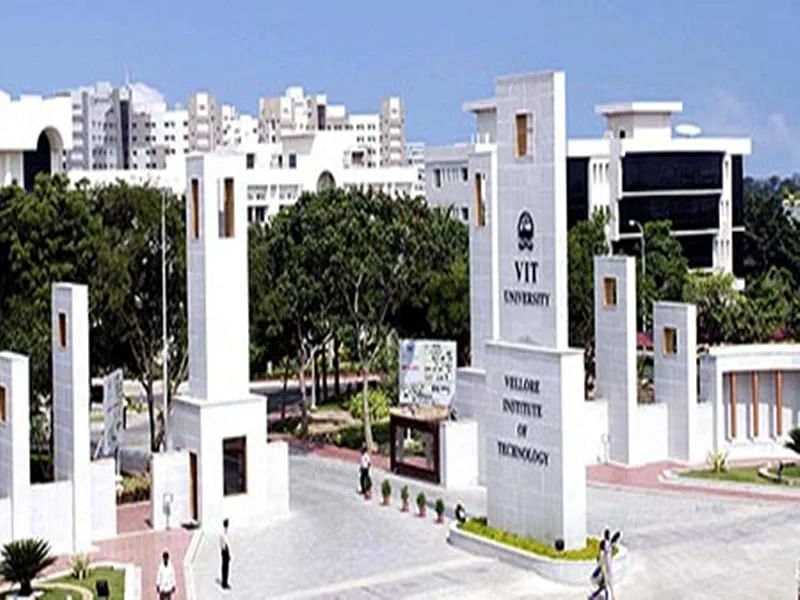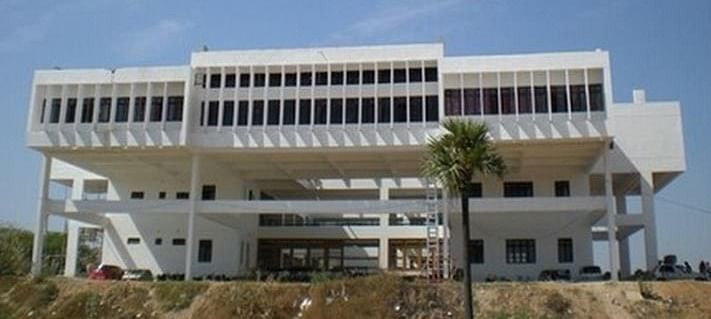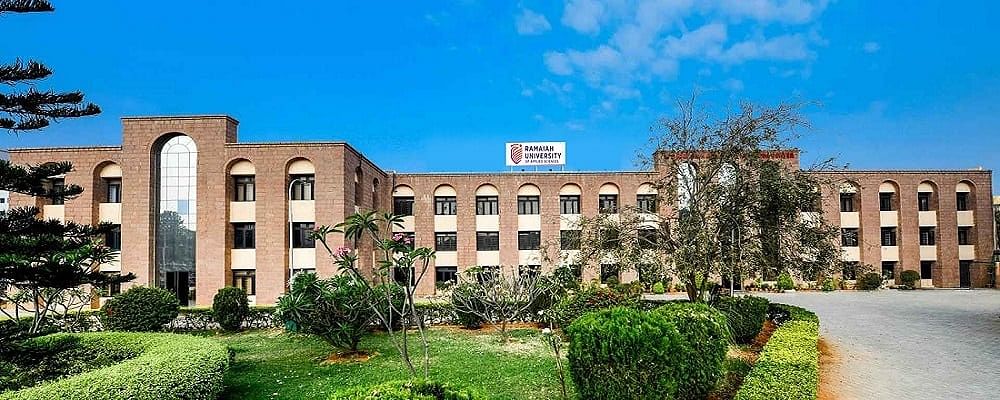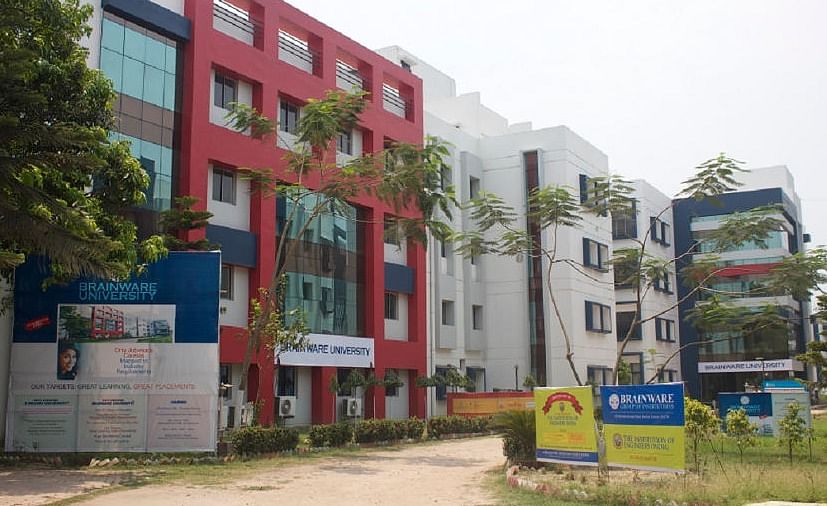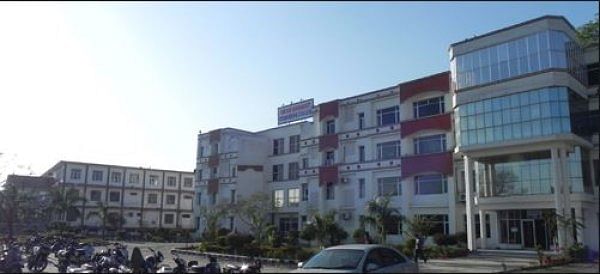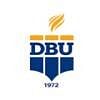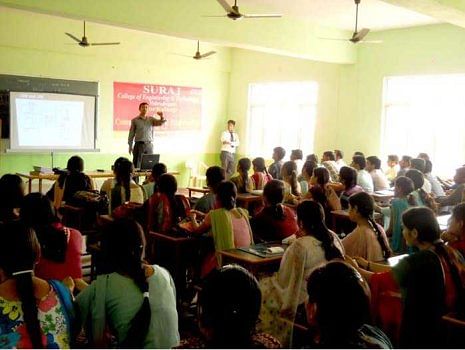B.Tech Robotics Engineering Syllabus and Subjects

The B.Tech Robotics Engineering syllabus is structured to help students get hold of fundamental engineering concepts required for robotics applications. Aspirants gain theoretical and practical exposure in applied thermodynamics, control systems, embedded systems, etc. The course structure introduces students to basic sciences for engineering and communication as foundation subjects in the first year. The second and third years syllabus offers in-depth core subjects charted as per the job market requirements. Along with the mandatory credit subjects, students can also select their electives based on choice-based credit.
Semester Wise B.Tech Robotics Engineering Syllabus
The core subjects in the B.Tech Robotics Engineering syllabus include applied thermodynamics, mechanics of solids, machine design, electrical measurement, signal processing, and much more. The curriculum is divided into eight semesters that provide core, basic sciences, practical and industrial-based training.
The B.Tech Robotics Engineering prepares students in multiple aspects of robotic designing. The course structure for B.Tech Robotics Engineering varies from one university to another. There are standard syllabus regulations provided by AICTE that are followed by private universities. The list below consists of a semester-wise split-up of the syllabus.
| SEMESTER I | SEMESTER II |
| Engineering Mathematics-I | Engineering Chemistry |
| Professional Communication Skills | Material Science |
| Basic Electrical and Electronics | Chemistry Laboratory |
| Engineering Physics | Environmental Science |
| Programming with C | Python for Problem-solving |
| Basic Electrical & Electronics Laboratory | Engineering Mechanics |
| Engineering Physics Laboratory | Engineering Maths - II |
| Engineering Graphics Laboratory | Computer Laboratory – I |
| SEMESTER III | SEMESTER IV |
| Applied Thermodynamics | Fluid Engineering |
| Electronics and Instrumentation | Statistics and Numerical Methods |
| Electronic Devices and Circuits | Electrical Machines |
| Strength of Materials | Machine Design |
| Mathematics -III | Automatic Control Systems |
| Thermodynamics Lab | Electrical Machines Lab |
| Electronics and Instrumentation Lab | Machine Design Lab |
| Electronic Devices and Circuits Lab | Fluid Engineering Lab |
| SEMESTER V | SEMESTER VI |
| Principles of Robotics | Elements of Mechatronics |
| Microcontrollers | Machine Vision Systems |
| Mechanical Engineering Design | Elective-II |
| Digital Image Processing and Machine Vision | Power Electronics and Drives |
| Robotics Laboratory | Pneumatics and Hydraulics |
| Elective -1 | Pneumatics and Hydraulics Systems Laboratory |
| Microcontrollers Lab | Power Electronics and Drives Lab |
| SEMESTER VII | SEMESTER VIII |
| Artificial Intelligence and Expert System | Flexible Manufacture and System |
| Computer-Aided Manufacturing | Professional Elective - IV |
| Field and Service Robotics | Viva Voce |
| Professional Elective - II | Project |
| Professional Elective - III | - |
| Computer-Aided Manufacturing Lab | - |
| Modeling and Simulation Lab | - |
B.Tech Robotics Engineering Subjects
B.Tech Robotics Engineering subjects are classified as engineering fundamentals, core, elective, and lab subjects. Practical sessions and industrial training are an essential part of the course. Students can choose elective subjects based on their domain of interests.
Core Subjects:
- Machine Design
- Applied Thermodynamics
- Fluid Engineering
- Power Electronics
- Computer-Aided Manufacturing
- Electric Drives
- Microcontrollers
- Hydraulics and Pneumatics
- Robotics engineering
Lab Subjects:
- Hydraulics and Pneumatics Laboratory
- Electrical Measurement Laboratory
- Electrical Machines Laboratory
- Thermodynamics Laboratory
- Power Electronics Lab
- Engineering Graphics
- Electives Lab
- Modeling and Simulation Lab
Elective Subjects:
- Autonomous Vehicles
- Robotics Operating System
- Mobile Robotics
- Medical Robotics
- VLSI Design
- Virtual Instrumentation
- Neural Networks and Fuzzy Systems
B.Tech Robotics Engineering Course Structure
B.Tech Robotics Engineering course structure is similar to the traditional engineering courses. Since robotics engineering involves application-based engineering study, the syllabus consists of a combination of core and elective subjects. Similar to the other engineering streams, the course is divided into eight semesters. The course provides more focus on applied mechanical engineering concepts along with electronics for robotic applications.
Students will also have an option to choose electives based on their specialization and areas of interest. They will be asked to submit research-based practical projects at the end of the VIII semester. The course structure is:
- VIII Semesters
- Fundamental, Core and Elective subjects
- Mandatory Internship/Seamanship Training
- Project Submission
B.Tech Robotics Engineering Teaching Methodology and Techniques
B.Tech Robotics Engineering teaching methodology is similar to that of other engineering courses. Apart from the traditional lecture-based training, the students are also provided additional practical training with edge tech labs, projects, and industrial training. Students can work either as a team or as individuals for the final year project. The research project and thesis formation motivate the students to understand the nuances of the process and provide a suitable solution based on automation systems. In short, the teaching methodology adopted for this course are:
- Practical Sessions
- Group Projects
- Paper Presentation
- Workshop
- Industrial Visits
- Internship
B.Tech Robotics Engineering Projects
B.Tech Robotics Engineering projects are generally done on specific robotics engineering operations and automation. The project aims to motivate the students to enhance their application skills in the research and development process. The majority of the projects must be done as live-model projects, while some can be done as a thesis. The students are given adequate practical industrial training to understand the nuances of workflow and problem identification.
Popular Robotics engineering projects are:
- Unmanned Ground Vehicle
- Automatic Bottle Closing System
- SLAM based Pick and Place Robot
- Prosthetic Arm
- Unmanned Air Vehicle
- Home Automation
B.Tech Robotics Engineering Reference Books
Listed below are the reference books used for B.Tech Robotics Engineering
| Books | Authors |
| Robotic Engineering – An Integrated Approach | Richard D Klafter |
| Introduction to Material Science for Engineering | James F Shackel |
| Engineering Mechanics – Statics and Dynamics | N.H. Dubey |
| Cognitive Robotics | Hooman Somani |
| Introduction to Machine Learning | Ethem Alpaydin |
| Microelectronic Circuits | A S Sedra |
| Control System Engineering | I.J. Nagrath and Gopal |
